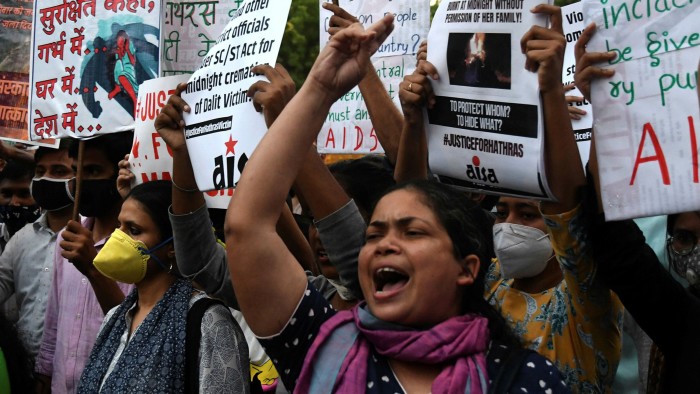Callous response to a violent rape sparks outrage in India


Roula Khalaf, Editor of the FT, selects her favourite stories in this weekly newsletter.
Eight years ago, India’s collective consciousness was shocked by the lethal gang rape, on board a New Delhi bus, of a 23-year-old physiotherapist returning home from watching a movie. The attack highlighted the dangers confronting young women who aspire to break out of the confines of traditional expectations. It triggered huge public protests.
Prime Minister Narendra Modi’s Bharatiya Janata party, which was then in opposition, made significant political capital out of the tragedy. Its 2014 election campaign ran a foreboding advert on women’s safety. Mr Modi accused the rival Congress party of turning Delhi into India’s “rape capital” and urged Indians to remember the victim when voting.
India is now being shaken by another grim sexual assault and murder, this time of a 19-year-old woman from the bottom of Hinduism’s caste hierarchy, in rural Uttar Pradesh, a state ruled by a BJP government and led by a controversial Hindu cleric, Yogi Adityanath.
The crime, which took place in a village 200 miles from New Delhi, is a potent reminder of the threat still facing young women. But the attack’s aftermath highlights growing accusations that the ruling party is determined to suppress bad news and bully into silence those who challenge its narrative.
The violence inflicted on the woman was extreme. Her attackers broke her spine, leaving her partially paralysed. Like the bus rape victim, whose killers were executed in March, she battled for life for nearly two weeks before she died. In that time, she identified her assailants as four upper-caste neighbours from the same community as Mr Adityanath.
Hours after her death, police cremated her body in a field under cover of darkness, rejecting her parents’ plea to bring her home for traditional last rites. The police were accused of confining the protesting family inside their home during the cremation, sparking national outrage.
For the next two days, state police barricaded roads into the village to prevent media and opposition politicians meeting the aggrieved family, which was reportedly under intense pressure to recant its allegation that the woman was raped. Mr Adityanath’s administration issued a press release denying any rape had occurred, claiming to have uncovered “a conspiracy to push the state into caste turmoil”. It warned it would “unveil the evil designs of vested interests who want to create atmosphere of disharmony”.
Authorities also leaked a recording of a conversation between a reporter for a prominent news channel and the victim’s brother, which the BJP cited as evidence that media was “inciting” the victim’s family to malign the state government. India Today shot back, demanding to know why the phones of its reporter, or the victim’s family, were under surveillance. “Persuading a victims’ family to speak out in the face of government intimidation and threats is very much part of what a tenacious journalist must do,” it said.
The Editor’s Guild of India declared the tapping of reporters’ phones and leaks of their conversations was part of a “growing trend . . .[of] harassment” in an attempt to “undermine and obstruct the functioning of the media”.
Journalists are not the only ones subjected to surveillance, or embarrassing public leaks. Recently, Bollywood actors’ private chats on WhatsApp were leaked to television news channels. Police have also used transcripts of WhatsApp chat groups to try to implicate people involved in peaceful protests against the country’s controversial new citizenship laws in violent riots in Delhi this year.
Many Indians with a public profile now assume they are under constant state surveillance and are no longer willing to speak frankly on the phone or via WhatsApp — especially about sensitive matters or if criticising government. The recent leaks of taped phone conversations demonstrate that their caution is not unfounded.
Caste-based gender violence has a long, ignoble history in India. It remains an emotive issue that can fuel political mobilisation. What is new is for authorities to brazenly array state powers against a murder victim’s grieving family, and deploy the high-tech tools of a surveillance state to intimidate those who are championing their cause.
Comments